

Macroeconomics Lecture. Complex systems. Complex systems present problems both in mathematical modelling and philosophical foundations.
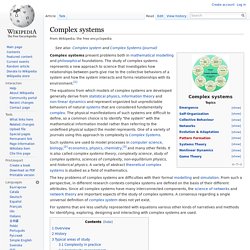
The study of complex systems represents a new approach to science that investigates how relationships between parts give rise to the collective behaviors of a system and how the system interacts and forms relationships with its environment.[1] Such systems are used to model processes in computer science, biology,[2] economics, physics, chemistry,[3] and many other fields.
It is also called complex systems theory, complexity science, study of complex systems, sciences of complexity, non-equilibrium physics, and historical physics. A variety of abstract theoretical complex systems is studied as a field of mathematics. Complexity economics. Adam Smith. 18th-century Scottish moral philosopher and political economist Adam Smith FRSA (16 June [O.S. 5 June] 1723[4] – 17 July 1790) was a Scottish economist, philosopher and author as well as a moral philosopher, a pioneer of political economy and a key figure during the Scottish Enlightenment,[5] also known as ''The Father of Economics''[6] or ''The Father of Capitalism''.[7] Smith wrote two classic works, The Theory of Moral Sentiments (1759) and An Inquiry into the Nature and Causes of the Wealth of Nations (1776).
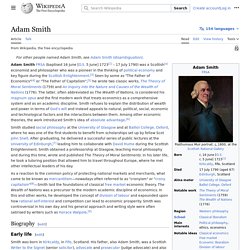
The latter, often abbreviated as The Wealth of Nations, is considered his magnum opus and the first modern work of economics. In his work, Adam Smith introduced his theory of absolute advantage.[8] Smith studied social philosophy at the University of Glasgow and at Balliol College, Oxford, where he was one of the first students to benefit from scholarships set up by fellow Scot John Snell. Smith laid the foundations of classical free market economic theory.
Biography[edit] Industrial Revolution. Iron and Coal, 1855–60, by William Bell Scott illustrates the central place of coal and iron working in the industrial revolution and the heavy engineering projects they made possible.
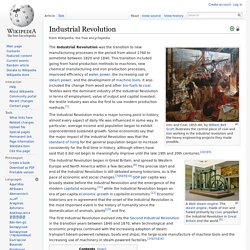
The Industrial Revolution was the transition to new manufacturing processes in the period from about 1760 to sometime between 1820 and 1840. This transition included going from hand production methods to machines, new chemical manufacturing and iron production processes, improved efficiency of water power, the increasing use of steam power, and the development of machine tools. It also included the change from wood and other bio-fuels to coal. Textiles were the dominant industry of the Industrial Revolution in terms of employment, value of output and capital invested; the textile industry was also the first to use modern production methods.[1] The Industrial Revolution marks a major turning point in history; almost every aspect of daily life was influenced in some way.
Etymology Textile manufacture Chemicals. Bottom-up development. Donald Cox, The Economics of "Believe-It-Or-Not" "To believe or not to believe?
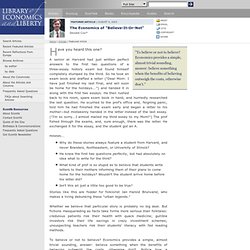
Economics provides a simple, almost trivial sounding, answer: believe something when the benefits of believing outweigh the costs, otherwise don't. " Have you heard this one? A senior at Harvard had just written perfect answers to the first two questions of a three-essay history exam but found himself completely stumped by the third. So he took an exam book and drafted a letter ("Dear Mom: I have just finished my last final, and will soon be home for the holidays... ") and handed it in along with the first two essays.
He then rushed back to his room, spare exam book in hand, and hurriedly researched the last question. Hmmm... Why do these stories always feature a student from Harvard, and never Brandeis, Northeastern, or University of Illinois? Stories like this are fodder for folklorist Jan Harold Brunvand, who makes a living debunking these "urban legends. " Whether we believe that particular story is probably no big deal. To believe or not to believe? Good. Noam Chomsky. Avram Noam Chomsky (/ˈnoʊm ˈtʃɒmski/; born December 7, 1928) is an American linguist, philosopher,[21][22] cognitive scientist, logician,[23][24][25] political commentator and anarcho-syndicalist activist.
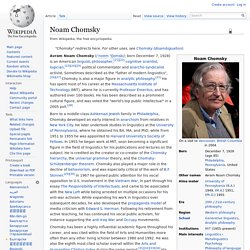
Sometimes described as the "father of modern linguistics",[26][27] Chomsky is also a major figure in analytic philosophy.[21] He has spent most of his career at the Massachusetts Institute of Technology (MIT), where he is currently Professor Emeritus, and has authored over 100 books. He has been described as a prominent cultural figure, and was voted the "world's top public intellectual" in a 2005 poll.[28] Born to a middle-class Ashkenazi Jewish family in Philadelphia, Chomsky developed an early interest in anarchism from relatives in New York City.
He later undertook studies in linguistics at the University of Pennsylvania, where he obtained his BA, MA, and PhD, while from 1951 to 1955 he was appointed to Harvard University's Society of Fellows. Early life Childhood: 1928–45. Evolutionary economics.